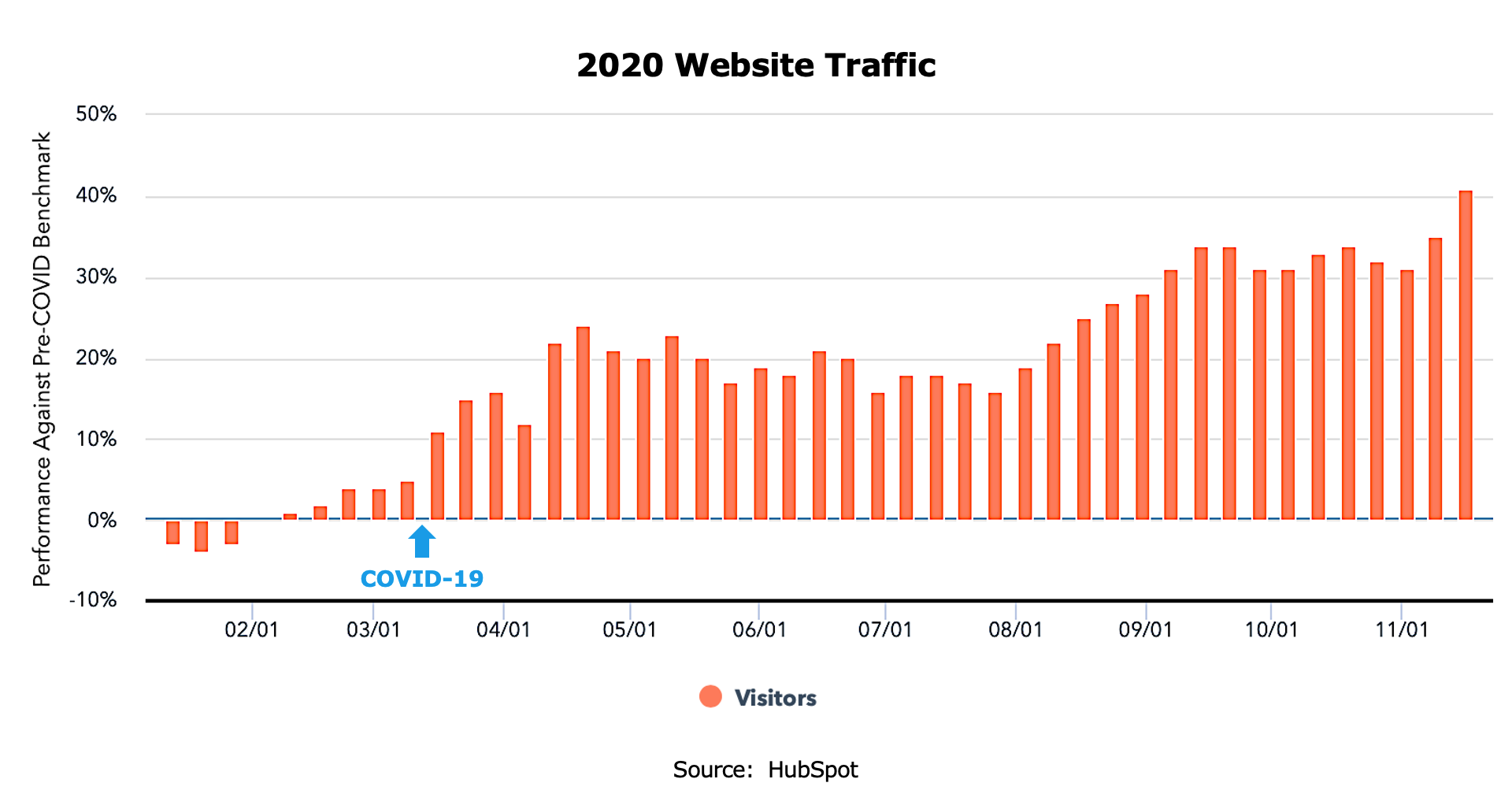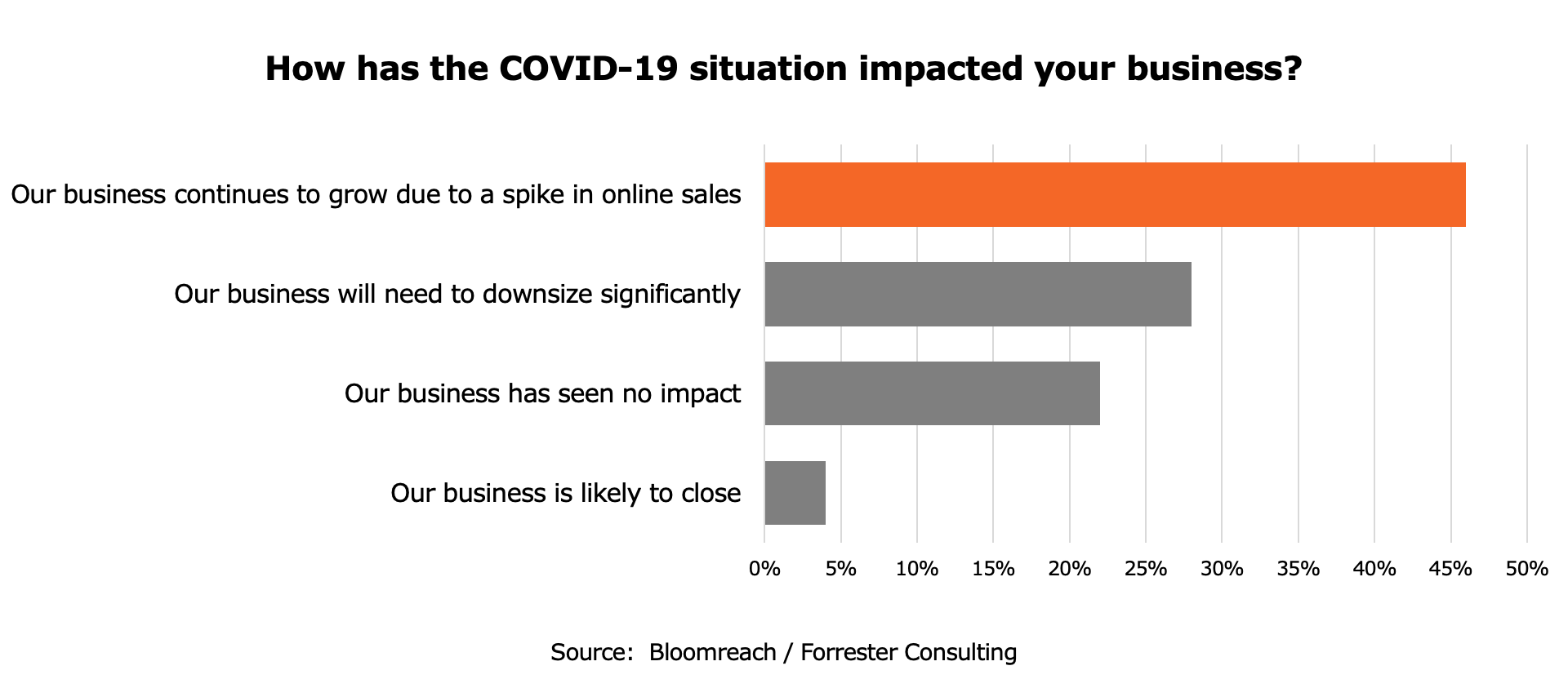CALL US TODAY: (877) 786-3249 x3
Schedule a Strategy Session

With the COVID-19 pandemic making business-as-usual “very unusual,” it is more important than ever for B2B companies to successfully reach their customers and prospects through their website and online presence. Increasingly, B2B buyers are going online to make business purchases at an unprecedented rate and companies with a results-focused website and online marketing strategy can reap great rewards – even during this crisis.
HubSpot, a B2B marketing automation platform, aggregated data from its customer base of more than 70,000 companies to understand how business metrics are shifting as businesses grapple with the impact of COVID-19. The following chart from HubSpot shows website traffic percentage increases in 2020 compared to 2019 (Pre-COVID) traffic levels.

When COVID-19 was declared a global pandemic in mid-March of this year, B2B website traffic took off with the highest increases recorded in recent weeks. As B2B buyers move their purchasing online due to the pandemic, businesses with an established online presence have a competitive advantage.
The question is: Did this increase in online traffic result in an increase in sales? The following chart tells a compelling story. Forrester Consulting surveyed business leaders to gain an understanding of how the COVID-19 pandemic impacted their businesses.
According to the survey, B2B companies with a results-focused website and online marketing strategy actually experienced growth during the current crisis. Nearly half of businesses that sell online (46%) report sales growth as a result of COVID-19. This growth is a direct consequence of increased online activity, search volume and website traffic.
Is your company ready for this surge in online business? To assess your situation and learn the key drivers of a B2B website that grows sales, consider the following questions to see if your website is “open for business.”
All too often, industrial companies do not design their website for their customers. Rather, they take an egocentric approach, more interested in talking about their products, their history, their news, their events, etc. While that information may be important to them, it’s not necessarily what their customers are interested in. If your website does not serve your prospects and customers, it is not serving you either.
A customer-focused website puts your customers at the center of your online offering, making it easy for them to do business with you. At the same time, a customer-focused website is aligned with your company’s overall business strategy and marketing objectives. And, most importantly, a customer-focused website produces results – leads, sales and profitable long-term customers. To be successful, your B2B website must:
If you think your website is just as a marketing tool, you are leaving money on the table. To build business these days, you need to think of your website as a sales tool – better yet, think of it as your best salesperson. According to Lead Forensics, 94% of the buyer’s journey occurs online before they speak to a sales rep, so it’s important for your website to serve that vital sales role.
Your website’s content needs to answer the key questions your salespeople normally answer in the sales process. To be successfully sales-focused, your website needs to answer the following questions:
In addition, your salespeople should be trained on how they can leverage the website’s content and features to enhance their own direct sales process. For your website to be a sales machine, your sales reps need to view it as their most valuable resource and not a threat to their commission.
As mentioned above, customers have taken control of the sales process. According to MarketingSherpa, in 80% of B2B transactions today, the customer finds the supplier – not the other way around. And, to perform this search, buyers are largely turning to Google. So, it is extremely important your site is optimized for search engines to ensure it is a money-maker.
The good news is that making your site appealing to Google is in line with your customer focus. Google wants you to provide value to your customers. If you are doing a great job creating valuable educational content for customers, you just have to use the right keyword phrases and group your content into topic-based clusters to help Google understand your areas of expertise. Other factors that Google considers include:
As a B2B company, the overall goal of your website is to drive revenue and profits. To accomplish this, your site needs to be strategically optimized to convert anonymous visitors into named leads and online sales.
Every page of your website should have a clear goal to move customers to the next step in their buyer’s journey with you. If you have not mapped out the conversion goal for each page, you are leaving the action up to chance.
In addition, you can ensure your website is conversion-focused by making it extremely easy for customer to take the next step through the following actions:
Don’t rely on subjective measures, gut feel or esoteric statistics like “visits” when tracking your website’s performance. Define your success measures based on the goals you want the site to achieve. Then identify specific, measurable performance criteria you can easily track to measure success. The following actions will help you keep score of your success:
It is certainly true that the current crisis created a challenging business climate for B2B companies. However, by embracing these ideas to create a website that attracts sales, your company will be in a position to succeed now, as well as in the coronavirus-free future.
If you like to turn your B2B website into a money-maker, I am here to help. Schedule a free website analysis with me. I will provide you with actionable tips and proven strategies to help you generate more leads, sales, and profits online.
